An investigation into how transcendental sound
transforms consciousness and invokes spiritual ecstasy
I do not know how much nectar the two syllables 'Krs-na' have produced. When the holy name of Krsna, is chanted, it appears to dance within the mouth. We then desire many, many mouths. When that name enters the holes of the ears, we desire many millions of ears. And when the holy name dances in the courtyard of the heart, it conquers the activities of the mind, and therefore all the senses become inert."
These lines, conceived in a state of religious ecstasy, flowed from the pen of Srila Rupa Gosvami, the great Vaisnava theologian and mystic, as he wrote his famous devotional drama Vidagdha-madhava in early sixteenth-century India. His equally famous brother, Srila Sanatana Gosvami, exults in his Brhad-bhagavatamrta,
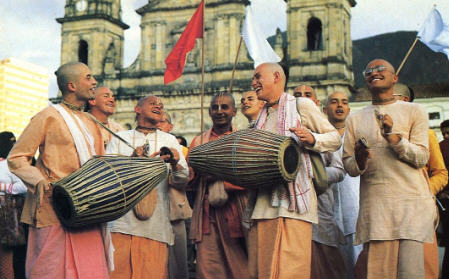
All glories to the all-blissful holy name of Sri Krsna, which causes the devotees to give up all conventional religious duties, meditation, and worship. When somehow or other uttered even once by a living entity, the holy name awards him liberation. The holy name of Krsna is the highest nectar. It is my very life and my only treasure.
To the uninitiated, these expressions of enthusiasm for the practice of contemplative recitation of the name of God may appear odd. For how can repeated recitation of mere sounds linguistic formulations transform consciousness and invoke ecstasy? Modern secular students of religion, especially those of a reductionistic temperament, seek often to divest such spiritual experiences of their unique metaphysical properties, attributing them to quantifiable psychological (or other) causes. Some even view them as pathological. But mere psychological reductionism can do little to shed light upon the profound religious experiences of those who "taste," in devotional ecstasy, "the nectar of the name. Nor can it explain the profound influence this practice has had on the religious adepts of many different spiritual traditions, most prominently the Vaisnava religious tradition of India, within which the theology and practice of the holy name has reached its highest development.
According to historically reliable literary accounts, medieval India witnessed a massive religious renaissance centered largely on the popular mysticism of the congregational chanting and singing of the names of God. This litany often took the form of themaha-mantra: Hare Krsna, Hare Krsna, Krsna Krsna, Hare Hare/ Hare Rama, Hare Rama, Rama Rama, Hare Hare. The great sixteenth-century saint Sri Caitanya, Himself worshiped as an incarnation of Lord Krsna, first turned this public congregational chanting (sankirtana) into a mass movement in Bengal and then spread it to other parts of north India, and later to the south of India, where, according to His-biographers, He traveled on foot for six years and converted millions to the religion of the holy name. The chanting of the divine name was no longer to be confined to the retreats of solitary mystics and hermits, but to spread itself widely and assume a central role in the spiritual lives of the common people. Exuberant chanting processions, accompanied by drums and cymbals, swept through the streets of the cities, towns, and villages, inundating countless people in a tidal wave of ecstasy emotion. Not only the common people but some of the most prominent religious intellectuals of the day, having first been inspired by the brilliance and clarity of His teachings, succumbed to the devotional ecstasy of Sri Caitanya's revivalist movement. No meant to remain confined even to India, Caitanya-style sankirtana has in recent decades appeared on Western shores, where members of the Hare Krsna movement, modern followers of Sri Caitanya, publicly chant in the streets of major cities.
Why the profound effect on human consciousness? How is this process of meditation performed? What are its effects? Why it universal appeal, which appears to transcend all historical and cultural bounds? To gain a deep understanding of these matters, we will need to explore the theological and mystical literature of the Vaisnava tradition. In preparation, because we are dealing with, subject that is not quantitative and empiric but experiential, we will need to suspend our limiting ethnocentric and ideological prejudices and attempt to understand these apparent mysteries with an open and inquisitive mind. To do so, let us assume the reverential attitude of the sincere pilgrim, for this will give us chance to penetrate the mystery. Now, let us proceed.
The Divine Attributes of the Holy Name
According to Vaisnava wisdom, the holy name of Krsna has extraordinary spiritual potency because the name of God is non-different from God Himself. In the material sense, name is different from form. Language is merely representative, symbolic; it does not itself embody the reality it seeks to represent. Recitation of the sound water does not quench our thirst, nor does calling the name of our beloved invoke the full presence of the beloved. In the divine realm, however, symbol embodies reality. Krsna self-manifests within His "sound incarnation," His holy name. In the only literary work ascribed to Sri Caitanya, the eight-verse Siksastaka, Sri Caitanya prays, "My Lord, in Your holy name there is all good fortune for the living entity, and therefore You have many names, such as Krsna and Govinda, by which You expand Yourself. You have invested all Your potencies in those names." That the name of God, being nondifferent from God manifests all transcendental potencies and attributes is explained in this verse from Padma Purana:
The holy name of Krsna is transcendentally blissful. It bestows all spiritual benedictions, for it is Krsna Himself, the reservoir of all pleasure. Krsna's name is complete, and it is the form of all transcendental mellows. It is not a material name under any condition, and it is no less powerful than Krsna Himself. Since Krsna's name is not contaminated by the material qualities, there is no question of its being involved with maya- [illusion). Krsna's name is always liberated and spiritual; it is never conditioned by the laws of material nature. This is because the name of Krsna and Krsna Himself are identical.
The great seventeenth-century Vaisnava poet Narottama dasa Thakura writes, golokera prema-dhana, hari-nama-sankirtana: the transcendental sound of the holy name of the Lord has its origin in the spiritual world.
Being the sound incarnation of the Lord, therefore, the holy name is not an ordinary material sound; it is divine, transcendental. But the divine nature of the holy name remains forever a mystery to those whose approach is merely empiric or intellectual. In discussing the theology of the holy name with an assembly of scholars, Srila Haridasa Thakura, the great teacher of the name, asserted, "One cannot understand the glories of the holy name merely by logic and argument." The holy name is understood and experienced only by those who have renounced all conceit and pretension and directly embraced the process of chanting with humility, faith, and devotion. As sound transmitted from afar can be heard when received by an appropriate electronic device, so transcendent, spiritual sound can be properly heard and assimilated by one equipped with the proper means to receive it: bhagavata-prema, love of God.
The Practice of Chanting the Holy Name
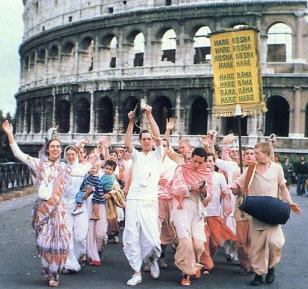
Since the holy name is spiritual, it must be received from spiritual sources. The holy name-and, ultimately, all spiritual wisdom is preserved and transmitted by generation after generation of realized souls comprising a disciplic succession of spiritual teachers. The mantra, the holy name, which is the seed of spiritual devotion, is planted within the heart of the sincere disciple by the spiritual master at the time of formal spiritual initiation. When uttered in devotion by a fully realized guru, the holy name has great efficacy upon the hearer, who achieves immediate benefit. Having received the holy name from the lips of a spiritual master, the student embarks upon the path of daily chanting, being careful to pronounce the mantra clearly and distinctly and to chant loudly enough to hear himself. The chanter must absorb his consciousness deeply within the divine sound of the mantra, vigilantly protecting the mind from the distraction of trivial or directionless thought.
The chanting of the holy name is not, however, a mechanical process depending merely upon contemplative prowess. It is a devotional art, a form of prayer, and thus one must chant with reverence and devotion. The Hare Krsna mantra is a prayer for protection and deliverance, a prayer to the Lord for His divine presence and for the opportunity to serve Him. Chanting is compared to the helpless cry of a child for its mother. It is a prayer from the core of the repentant heart. It is chanted, therefore, in humility. Once, in a state of devotional ecstasy while in the company of two close followers (Svarupa Damodara Gosvami and Ramananda Raya), Sri Caitanya described the quintessential importance of chanting with the mood of humility. He said, "One who thinks himself lower than the grass, who is more tolerant than a tree, and who does not expect personal honor but is always prepared to give all respect to others, can very easily always chant the holy name of the Lord." Commenting up on this famous verse, Krsnadasa Kaviraja Gosvami, author of Sri Caitanya-caritamrta,declares, "Everyone please hear me! String this verse on the thread of the holy name and wear it on your neck for continuous remembrance. One must strictly follow the principles given by Lord Caitanya Mahaprabhu in this verse. If one simply does so, certainly he will achieve the ultimate goal of life, the lotus feet of Sri Krsna."
When and where is chanting appropriate? There is no restriction as to the appropriate time or place for chanting the holy name. The devotee is advised to chant always and everywhere. The process of God realization is not a mere liturgical or social formality to be restricted to circumscribed times and places. It is a quest that should underlie and pervade all one's activities. In Bhagavad-gita, Krsna describes that great souls (mahatmas) constantly chant His glories (satatam kirtayanto mam). The final line of Sri Caitanya's prayer mentioned above recommends that one chant the holy name continuously (kirtaniyah sada harih). Srila Haridasa Thakura says, nirantara nama lao: "Chant the holy name without stopping."
To experience the full effects of the holy name, one must attain the stage of offenseless chanting. According to Vaisnava scripture, there are three progressive stages in the development of chanting: the offensive stage (nama-aparadha), the stage of lessening offenses (namabhasa), and the offenseless, pure stage. A neophyte commits offenses against the holy name. According to Padma Purana, there are ten offenses, involving misuse of or mundane misconceptions about the holy name and the scriptures and Saints who embody and teach the holy name. One who remains at the offensive stage does not attain the ultimate goal of chanting, love of God. Says Krsnadasa Kaviraja, "If one chants the exalted holy name of the Lord again and again and yet his love for the Supreme Lord does not develop and tears do not appear in his eyes, it is evident that because of his offenses in chanting, the seed of the holy name of Krsna does not sprout." In fact, without giving up the offenses in chanting, one does not develop a spontaneous attachment for chanting. Taking the role of a conditioned soul, Sri Caitanya prays, "My dear Lord, although You bestow mercy upon the fallen conditioned souls by liberally teaching Your holy names, I am so unfortunate that I commit offenses while chanting the holy name, and therefore I do not achieve attachment for chanting."
How can one overcome offenses and develop pure chanting? By more chanting. In his commentary on Srimad-Bhagavatam (Bhagavata-Purana), Srila Visvanatha Cakravarti Thakura quotes a verse from Padma Purana stating that even if in the beginning one chants the Hare Krsna mantra with offenses, one can become free from such offenses by repeated chanting. By the immense purificatory power of the holy name, constant chanting frees one from offenses to the holy name and gradually elevates one to the transcendental platform of pure chanting, by which one can attain pure love of God. Elsewhere it is recommended that one can also overcome offenses by realizing that the holy name is nondifferent from the Lord, by chanting in humility, and by developing an attitude of service to the Lord.
After the offensive stage, as one's offenses cease, one approaches the platform of pure chanting. Finally, with offenseless chanting, one becomes completely enlightened and liberated, and one's dormant love of God fully awakens. In that stage, one actually enters the kingdom of God, although physically he may apparently be within the material world.
The Transcendental Effects of the Holy Name
The holy name exerts the deepest and most profound influence upon those who invoke it in a mood of reverential devotion.
Freedom from the Reactions to Sin
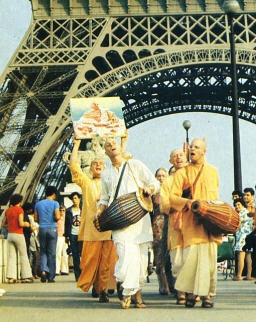
First, the holy name eradicates the results of sins committed both in the present and in prior lifetimes. According to the law of karma, a human being is responsible for the sinful acts he performs and must suffer for them ("As ye sow, so shall ye reap"). Deeply enmeshed in a complex web of material actions and their reactions, one must suffer the duality of pleasure and pain, lifetime after lifetime. The holy name, however, eradicates all reactions to past sins, both those manifesting themselves at present and those destined to manifest themselves in the future. Simply by chanting the holy name, one attracts the attention of the Supreme Lord, who therefore considers, "Because this person has chanted My holy name, My duty is to give him protection." The power of the holy name to absolve sins is declared emphatically in the scriptures. The Garuda Purana tells us, "If one chants the holy name of the Lord, even in helplessness or without desiring to do so, all the reactions of his sinful life depart, just as when a lion roars all the small animals flee in fear." Says the Brhad-visnu Purana, "Simply by chanting the name of Han, a sinful man can counteract the reactions to more sins than he is able to commit." In the Visnu-dharmottara we read, "This word krsna is so auspicious that anyone who chants this holy name rids himself immediately of the reactions of sinful activities from many, many births." But for the chanting of the holy name to exert such a powerful purifying effect, the devotee must chant the holy name in purity, without offense. Having ceased to indulge in sinful actions, he must live a pure and holy life.
Freedom from Desire Due to Illusion
How can one escape the will to sin? By escaping the illusion that supports it the illusion that the material body is the self. When the embodied soul erroneously identifies himself with the gross material body and its subtle mind, intellect, and false ego, he seeks pleasure in the comfort and gratification of the body. As he wanders throughout the material creation, lifetime after lifetime, trying to dominate and enjoy the resources of the phenomenal world, he goes through myriad temporary, fleeting sensory experiences, which create myriad impressions of the phenomenal world upon his heart and consciousness. In this way, his original, pure consciousness becomes covered by layer after layer of material contamination. Because the self is purely spiritual, no variety or amount of physical or mental gratification can give him real satisfaction. Under the illusion of bodily identification, therefore, he perpetually suffers the unnatural and frustrating condition of material existence.
This illusion and its painful effects, which have haunted and tormented the embodied soul since time immemorial, are destroyed by the transcendental effects of the holy name. Because the divine name and the Lord Himself are identical, when one regularly chants the holy name he develops attraction toward the Lord Himself. That divine, spontaneous attraction cleanses his heart of all desires for lesser, material pleasures. Lord Krsna personally aids in that progressive purification, as the great devotee Suta Gosvami explained to the sages assembled at Naimisaranya Forest: "Sri Krsna, the Personality of Godhead, who is the Paramatma [Supersoul] in everyone's heart and the benefactor of the truthful devotee, cleanses desire for material enjoyment from the heart of the devotee who has developed the urge to hear His messages, which are in themselves virtuous when properly heard and chanted." When the heart is fully purified by chanting of the holy name, the devotee loses interest in everything unspiritual. He views the entire creation as the Lord's energy and thus gives up the desire to exploit and consume matter. As chanting cleanses the mirror of the heart (ceto-darpana-marjanam), one fully awakens to spiritual reality.
Enlightenment
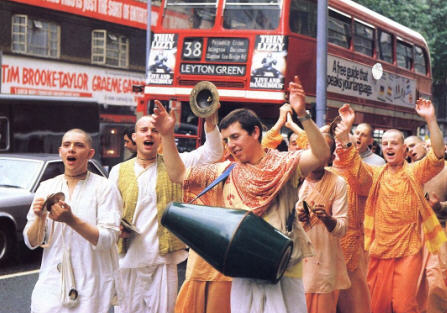
All knowledge, both spiritual and material, is contained within the ancient writings called the Vedas. The knowledge of the Vedas is said to be eternal and of divine origin; it is not a creation of historical, imperfect human speculation. Long before the Vedic literature was compiled (by Srila Vyasadeva, the 'literary incarnation of God," according to orthodox Vedic historiography). that Vedic knowledge existed in the form of pure, transcendental sound (sabda-brahman). In the Bhagavad-gita, Lord Krsna, thc speaker of the Gita, identifies Himself as the summum bonum of Vedic knowledge: "By all the Vedas, I am to be known" (vedais ca sarvair aham eva vedyo). The holy name of Lord Krsna, being nondifferent from the Lord Himself, is the quintessence of the Vedas, and therefore of all knowledge. Chanting the holy name thus enlightens the soul with complete knowledge knowledge of his own existential identity, of the material and spiritual worlds, of God, of the soul's eternal relationship with God, and of the means to revive that transcendental relationship. The maha-mantra embodies all knowledge, all wisdom.
Those who worship the Lord by chanting His holy name invoke the mercy of the Lord, who acts as the indwelling teacher (caitya-guru) and supreme friend of the conditioned soul by enlightening the soul from within: "To those who are constantly devoted and who worship Me with love, I give the understanding by which they can come to Me. Out of compassion, I, dwelling within their hearts, destroy with the lamp of knowledge the darkness born of ignorance." Rupa Gosvami compares the holy name to the sun, "for just as a slight appearance of the sun dissipates the darkness of night, so a slight appearance of the holy name of Krsna can drive away all the darkness of ignorance that arises in the heart because of greatly sinful activities performed in previous lives."
Liberation
When through purification and knowledge one no longer identifies himself with the material body and the material world, he ceases to engage in material actions, and thus he is freed from material reactions. Thus freed, he no longer has to take birth again. He is free from samsara, the cycle of repeated birth and death. This is the meaning of moksa, liberation. Spiritual sound (sabda-brahman) has the power to liberate. The Vedanta-sutra speaks of anavrttih sabdat, "liberation by sound."
The ease with which one attains liberation through chanting is affirmed in the Skanda Purana: "By once chanting the holy name of the Lord, which consists of the two syllables ha-ri, one guarantees his path to liberation." As stated in Srimad-Bhagavatam, even unconscious chanting brings results: "Living beings entangled in the complicated meshes of birth and death can be freed immediately by even unconsciously chanting the holy name of Krsna." "Even the faintest rays of the effulgence of the Lord's holy name," says Haridasa Thakura, "can grant one liberation."
God Consciousness
Ultimately, the chanting of the holy name produces God consciousness, which culminates in ecstatic devotion to Krsna (krsna-bhakti). Liberation (moksa) is not the ultimate in spiritual perfection. It simply indicates freedom from, or a negation of, material existence. Once liberated from material contamination, the soul must return to its original, constitutional position as a loving servant of the Lord.
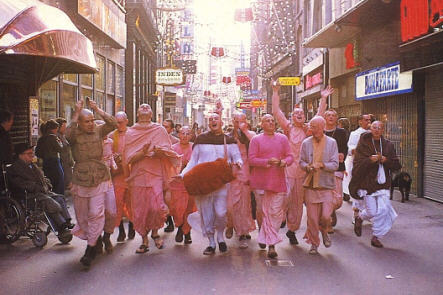
As one progresses on the path of bhakti, divine love of God, the chanting of the holy name brings one into closer and closer contact with the Lord. On that path, the holy name invokes remembrance of the Lord, association with the Lord (via His form as sound), attraction to the Lord, the transcendental ("beatific") vision (darsana) of the Lord, and finally divine love of God, wherein the devotee experiences various and intense spiritual ecstasies.
One should note that the efficacy of the process of chanting presupposes the Lord's direct intervention in the devotional life of the spiritual adept. There is, in other words, nothing automatic or mechanical about the process of chanting. Revival of the soul's dormant God consciousness depends not on any ritualized litany but on the causeless mercy of the Lord, who responds to the sincere efforts of His devotee to glorify Him in devotion.
Since the holy name is Krsna Himself, the chanting of the holy name invokes remembrance of and association with Krsna Himself. Recollection, absorption, meditation, constant remembrance, and trance (samadhi) are the five stages in progressive remembrance of Krsna (krsna-smarana). In conscious remembrance, the devotee feels the presence of the Lord as a transcendental, mystical fact. When the devotee chants the holy name, all the Lord's transcendental opulences-His divine form, activities, qualities, and so on become manifest within the devotee's heart. Indeed, Krsna Himself appears. "My dear Narada, I do not actually reside in My abode, Vaikuntha, nor within the hearts of the yogis. I reside where My pure devotees chant My holy name and discuss My form, pastimes, and qualities." (Padma Purana) Thus, the devotee's consciousness becomes attracted to Lord Krsna. Along with remembrance, association, and attraction, the devotee's attitude of service to the Lord develops, and in an advanced stage the devotee engages directly in the service of the Lord in the spiritual realm, even while situated within the material body. Thus, through pure, devotional chanting of the holy name, the devotee directly realizes the presence of the Lord and enters the deepest mysteries of God consciousness.
Ecstatic Love of God
Absorption in God consciousness culminates in prema-bhakti, pure love of God. Writes Krsnadasa Kaviraja Gosvami, "The holy name of Krsna is so attractive that anyone who chants it . . . becomes imbued with love of Krsna. This is the effect of chanting the Hare Krsna mantra." Sri Caitanya similarly instructs Sanatana Gosvami, "Of the nine processes of devotional service, the most important is to chant the holy name of the Lord always. If one does so, avoiding the ten kinds of offenses, one very easily obtains the most valuable love of Godhead."
Pure love for Krsna elicits the most sublime and lofty emotions of the soul. Liberation or spiritual perfection implies not the absence of cognition or emotion, but their ultimate perfection. Within the soul are profound transcendental emotions, which lie dormant as long as the soul sleeps in maya, material illusion. But such sublime emotions awaken with the awakening of pure, spiritual consciousness. The entire range of emotions experienced by a conditioned soul (such as happiness and misery, love and hate, compassion and envy) are merely dim and perverted reflections of their spiritual counterparts, which exist in absolute purity and are experienced by fully realized souls in their eternal relationship with the Lord. When the soul has awakened to pure love of Krsna, he tastes the infinitely sweet flavors of a wide variety of transcendental emotions, emotions which are variegated manifestations of spiritual ecstasy. Such transcendental, ecstatic emotions within the heart and mind of the pure devotee are so powerful that they erupt and spill over into the realm of the physical. In pursuance of the order of His spiritual master, Sri Caitanya entered upon the path of constant chanting of the holy name of Krsna. When such chanting invoked intense spiritual ecstasy, He wondered whether He had lost His sanity. He approached His guru, Isvara Puri, who then explained,
It is a characteristic of love of Godhead that by nature it induces transcendental symptoms in one's body and makes one more and more greedy to achieve the shelter of the lotus feet of the Lord. When one actually develops love of Godhead, he naturally sometimes cries, sometimes laughs, sometimes chants, and sometimes runs here and there Just like a madman. Perspiration, trembling, standing of one's bodily hairs, tears, faltering, fading, madness, melancholy, patience, pride, joy, and humility-these are various natural symptoms of ecstatic love of Godhead, which causes a devotee to dance and float in an ocean of transcendental bliss while chanting the Hare Krsna mantra.
Of course, such states of spiritual ecstasy are very rarely achieved. They are experienced only by those who have entered the most intimate, confidential relationship with Lord Krsna. Such experiences are unavailable even to those who worship the Lord in awe and veneration, viewing the Lord merely in His aspect of greatness, power, and majesty. The divine flavors of such ecstasy are relished by those who, by the grace of the Lord, gaze beyond His majestic feature and deal with Him in spontaneous, intimate affection. As stated in Caitanya-caritamrta, the pure devotional chanting of Lord Krsna's personal names ushers the devotee into the Lord's personal presence and into the highest bliss: "Dealings in affection with the Supreme Personality of Godhead bring happiness many millions of times greater than dealing with Him in awe and veneration. Simply by hearing the holy name of the Lord, the devotee is merged in transcendental bliss."
Beyond Death
By chanting the holy name in purity and devotion throughout his life, the devotee returns to Krsna at the time of death. Lord Krsna explains in Bhagavad-gita,
Whoever, at the time of death, quits his body remembering Me alone at once attains My nature. Of this there is no doubt. Whatever state of being one remembers when he quits his body, that state he will attain without fail. . . . He who meditates on Me, the Supreme Personality of Godhead, his mind constantly engaged in remembering Me, undeviated from the path, . . . is sure to reach Me.
Thus by chanting at the time of leaving the material body, the devotee who has practiced krsna-smarana, remembrance of Krsna, by chanting Krsna's holy names throughout his life can escape the painful cycle of birth and death and return to Krsna in the spiritual realm (Vaikuntha) to render Him intimate, ecstatic. loving service.
The Divine Dispensation
Apart from the holy name's importance as a means toward individual spiritual perfection, a reading of Vaisnava literature reveals the holy name to possess the broadest historical and universal significance as well. Chanting of the holy name is in fact described as the universal and supreme religion in the current epoch, an epoch referred to in traditional Indian texts as Kali-yuga, "the Age of Kali," the great Iron Age, an age of materialism, hypocrisy, and quarrel. Kali-yuga is the last of the four Great Ages, each progressively worse than its predecessor, four vast epochs that cycle perpetually. The Age of Kali is the age wherein human society degrades from human to subhuman, in which the people of the world forget their souls, identify with their gross bodies, and become mad competitors for the world's stock of material goods and pleasures. As stated in Srimad-Bhagavatam, the unfortunate inhabitants of the Kali Age are "quarrelsome, lazy, misguided, unlucky, and, above all, always disturbed."
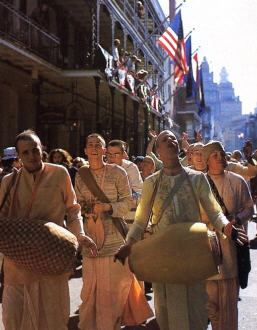
Because such unfortunate persons have little or no inclination toward spiritual advancement, there is a compelling need for a simple method by which they can wake up from their deathly slumber and receive the opportunity for spiritual emancipation. That Great Dispensation is the holy name. Declares Krsnadasa Kaviraja Gosvami, "In the Age of Kali, Lord Krsna has descended in the form of the holy name." The holy name is the one true glory, the one saving grace of this condemned age, as Sukadeva Gosvami tells King Pariksit: "Al though Kali-yuga is full of faults, there is still one good quality about this age. It is that simply by chanting the holy name of Krsna one can become free from material bondage and be promoted to the transcendental kingdom." Various means of spiritual advancement practiced in the previous eras are rendered virtually ineffectual in Kali by the degradation of human beings, individually and collectively. The chanting of the holy name now supersedes all other forms of spiritual discipline: "Whatever result was obtained in Satya-yuga by meditating on Visnu, in Treta-yuga by performing sacrifices, and in Dvapara-yuga by serving the Lord's lotus feet can also be obtained in Kali-yuga simply by chanting the holy name of the Lord."(Srimad-Bhagavatam 12.3.52) The primacy and exclusivity of the practice of the holy name is emphatically declared in this often cited verse from the Brhan-naradiya Purana: "In this Age of Kali there is no alternative, there is no alternative, there is no alternative for spiritual progress but the holy name, the holy name, the holy name of the Lord." Thus the chanting of the holy name of the Lord is the yuga-dharma, the universal and supreme religion of the age, meant to unite all faiths in common, joyful glorification of the one Supreme Lord.
Although the chanting of the holy name has played a role in India's religious history for millennia, it was specifically propagated and popularized as the yuga-dharma by the great Caitanya, whose effulgent presence and fervid ecstasies drew millions intonama-dharma, the Religion of the Name. As the great popularizer of the holy name, Sri Caitanya was regarded and worshiped as the Kali-yuga avatara, the prime avatara (incarnation) for the Age of Kali. Further, He was worshiped as the greatest incarnation of the Lord because He liberally bestowed pure Krsna-bhakti, ecstatic love of God, upon all persons. The maha-mantra, the chant popularized by Sri Caitanya, is specifically mentioned in the Kalisantarana Upanisad as the exclusive means for escaping the debilitating conditions of the Kali Age: "Hare Krsna, Hare Krsna, Krsna Krsna, Hare Hare/ Hare Rama, Hare Rama, Rama Rama, Hare Hare these sixteen names composed of thirty-two syllables are the only means to counteract the evil effects of Kali-yuga. In all the Vedas it is seen that to cross the ocean of nescience there is no alternative to the chanting of the holy name." Not only does the holy name bestow the highest benefits upon human beings both individually and collectively, but it purifies even lower species of life. Any living being fortunate enough to hear the divine, transcendental sound incarnation of the Lord receives immense spiritual benefit.
Sri Caitanya did not intend the holy name to remain confined to India, but predicted that the holy name would reach "every town and village." Four centuries later, this missionary ideal, based upon a compelling vision of the universality of the holy name, gained momentum through the efforts of Srila Bhaktivinoda Thakura, a great follower and ninth-generation disciplic representative of Sri Caitanya. Writing in his religious journal Sajjana-tosani in 1885, he declared prophetically,
Lord Caitanya did not advent Himself to liberate only a few men in India. Rather, His main objective was to emancipate all living entities of all countries throughout the entire universe and preach the Eternal Religion. . . . There is no doubt that this unquestionable order will come to pass. . . . Very soon the unparalleled path of hari-nama-sankirtana will be propagated all over the world. . . . Oh, for that day when the fortunate English, French, Russian, German, and American people will take up banners, mrdangas and karatalas and raise kirtana through their streets and towns! When will that day come? . . . That day will witness the holy transcendental ecstasy of the Vaisnava dharma to be the only dharma, and all the Sects and religions will flow like rivers into the ocean of Vaisnava dharma. When will that day come?
Eighty years later, His Divine Grace A.C. Bhaktivedanta Swami Prabhupada, a disciple of Bhaktivinoda's son (Bhaktisiddhanta Sarasvati Gosvami), left India and traveled to the United States to transform Bhaktivinoda's dream into reality. In 1966 he founded the International Society for Krishna Consciousness, which, for its active propagation of the maha-mantra, came to be popularly known as "the Hare Krsna movement." The chanting and propagation of the holy name are the stated basis and goal of the movement. The Society's founder, Srila Prabhupada, writes, Sri Caitanya Mahaprabhu introduced the congregational chanting of the Hare Krsna mantra to give everyone a chance to hear Krsna's holy name, for simply by hearing [the holy name] one be comes purified. Therefore our Krsna consciousness movement I chiefly engaged in chanting the Hare Krsna mantra all over the. world." "The Krsna consciousness movement," he says, "is base on this principle: chant the Hare Krsna mantra at every moment as much as possible, both inside and outside of the temple." This movement "is especially meant for creating an atmosphere ii which people can take to the chanting of the Hare Krsna mantra." The public chanting of the holy name performed by Srila Prabhupada's followers, clad in traditional Indian dhotis and saris, is not a familiar sight on the streets of most major cities of the world.
The holy name of Krsna, for so long concealed within India locked away from Western view, has now entered the mainstream of Western society. It has become, so to speak, a "household mantra," available to everyone. But although it is in open, public view, the holy name is not an ordinary commodity one can find and purchase in the market. It is a hidden treasure. One must develop the eyes to see it or, rather, the ears to hear it. If one simply approaches the holy name with reverence and allows the holy name to enter through his ears into his heart, and especially if h accepts the divine name as his very life and soul, he can enter the deepest, most profound, most sublime of all spiritual mysteries.
Hare Krsna Hare Krsna Krsna Krsna Hare Hare Hare Rama Hare RamaRama Rama Hare Hare
SUBHANANDA DASA is Senior Editor of the Bhaktivedanta Book Trust and ISKCON's Director for Interreligious Affairs. He has compile and edited a compendium of instructions concerning the holy name, derived from the books of His Divine Grace A.C. Bhaktivedanta Swami Prabhupada.
